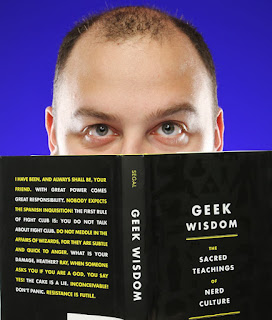 In my continuing quest to find interesting material in the area of the fantastic I stumbled across the book Geek Wisdom: The Sacred Teachings of Nerd Culture (Quirk Books, 2011 ), edited by Stephen H. Segal. Segal is the Hugo Award winning senior contributing editor to Weird Tales, the world’s oldest fantasy/sci-fi/horror magazine, and an editor at Quirk Books. The book includes a sampling of well known phrases from various expressions of pop culture, whether film, television, literature, and comics, comprising that subcultural phenomenon known variously as geek or nerd culture. The phrases are divided into various categories, including wisdom about the self, relationships, humankind, conflict, the universe, and the future. Many of the phrases are well known outside of this specific culture or subculture (which raises questions as to whether a reference to geek culture is too narrow), such as:
In my continuing quest to find interesting material in the area of the fantastic I stumbled across the book Geek Wisdom: The Sacred Teachings of Nerd Culture (Quirk Books, 2011 ), edited by Stephen H. Segal. Segal is the Hugo Award winning senior contributing editor to Weird Tales, the world’s oldest fantasy/sci-fi/horror magazine, and an editor at Quirk Books. The book includes a sampling of well known phrases from various expressions of pop culture, whether film, television, literature, and comics, comprising that subcultural phenomenon known variously as geek or nerd culture. The phrases are divided into various categories, including wisdom about the self, relationships, humankind, conflict, the universe, and the future. Many of the phrases are well known outside of this specific culture or subculture (which raises questions as to whether a reference to geek culture is too narrow), such as:
“I have been, and always shall be, your friend.”
“With great power comes great responsibility.”
“Destiny! Destiny! No escaping that for me!”
(You can read Segal’s Top 10 Geek Quotes with photos in a piece at The Huffington Post.)
The editor and contributors to Geek Wisdom present this collection of phrases connected to commentary as a form of contemporary wisdom for reflection. The reader might be tempted to dismiss this as a form of humor, but that would be a mistake. A case is made for the legitimacy of these “wisdom sayings” that spring from a seemingly unlikely collection of sources.
In the Introduction to the book a reference is made to science fiction functioning as a religion for the editor as he was growing up. Again, this may sound outlandish, but the question is raised as to what religion is, and it is suggested that it is in essence a framework of ideas shared by a community that is handed down and which attempts to answer the big questions of life. The scriptures of the world’s religions attempt to answer these questions through various stories, and the contributors to Geek Wisdom make the point that the world’s religions and their scriptures are not the only places where such stories and answers can be found. Now, popular culture provides its own set of stories that wrestle with life, and from them a collection of wisdom sayings arises.
Those members of conservative religious traditions will likely be scandalized by the idea that genuine wisdom, perhaps even sacred wisdom, can be found from such “secular” sources. But when we recall, for example, that the Judeo-Christian tradition collected its wisdom teachings by drawing upon aspects of mundane life in the ancient near east and then drew spiritual applications, perhaps there is there a sense in which popular culture provides a wisdom that can be drawn upon for people today, and it too can have spiritual applications.
For those interested in thinking about memorable catch phrases from popular culture in new ways, and for those daring folks willing to consider the possibility of encountering the sacred, Geek Wisdom is highly recommended.





In my college days, I often bought issues of CCM (Contemporary Christian Music) magazine. It included a policy statement that noted that its philosophy was ‘All truth comes from God.’ This allowed it to review music and albums from artists not usually associted with the Christian music industry, like Peter Gabriel and the Talking Heads, etc.
I think this philosophy applies here as well. I see it as an extension of the theory proposed by Tolkien that all good stories are echoes of the True story.